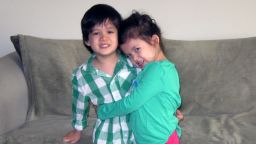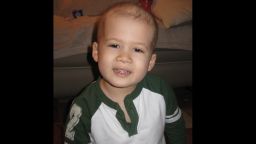Story highlights
The Shepard family discovered when son Maddox was 2 that he had leukemia
Maddox's mom, Geri, was diagnosed with breast cancer two years later
St. Baldrick's, a nonprofit dedicated to raising awareness for childhood cancer, helped them connect with other families
In June 2009, Brad and Geri Shepard took their two young children to visit their grandparents, expecting a nice vacation and quality time for the whole family.
But Grandma Shepard was worried as soon as she saw 2-year-old Maddox step out of the car. He looked pale, Brad said. Over the course of the weekend, the normally active toddler was tired, lacked an appetite and developed a fever. The previous month, Maddox had fevers and bruising, which his pediatrician chalked up to viruses and playing at the playground.
Brad and Geri thought they were being overanxious, but Grandma Shepard’s reaction was enough to convince Geri that she should call the doctor at home and request a blood test.
Maddox registered as anemic with low blood counts. After a bone marrow biopsy, it was confirmed that Maddox had acute lymphoblastic leukemia. He was put into isolation and began chemotherapy immediately. Maddox was scared. His parents were terrified.
“How do you begin to explain this to a child?” Geri said. “At any age, cancer is awful, but for a kid, it’s devastating. They should be having playdates instead of chemotherapy.”
Little did they know, the family’s cancer battle was just beginning.
Defining a new normal
Brad took time off work and he and Geri took shifts at the hospital for five intense weeks before Maddox could continue his treatment from home. Maddox also had surgery to install a medical port in his chest, which made the chemotherapy treatments a little easier.
They came up with names to make everything less scary for Maddox. Taking his blood pressure became “arm hugs,” his IV was a “necklace” and the clinic he would visit on a weekly basis became “the kitchen,” mainly because he loved to play with the toddler kitchenette set there.
While Maddox was in isolation, their 1-year-old daughter, Danika, was in the care of her grandmother. Normally, she shared a room with him. She didn’t understand why she couldn’t visit Maddox, or that just going to see him in isolation could expose his vulnerable immune system to harmful germs.
The entire family rejoiced when Maddox was able to go home, and the Shepards had to adjust to a new normal. They installed a hand sanitizer machine by the front door, moved medical equipment into the house and had to go to the hospital two to three times a week for daylong appointments. Geri mixed his chemo and administered it each day and night.
“In the beginning, you feel like your child’s life is in your hands,” Geri said.

They settled into a routine: Because of Brad’s work, Geri would take Maddox to the clinic and keep up with his medicine. But if anything went wrong for Maddox after 5 p.m., Brad would rush him to the ER since the clinic was closed. He spent many long, grueling nights making sure his son received the proper treatments.
Maddox couldn’t be around other children or in public spaces, so he and Danika bonded even more by spending so much time together. Still, Geri’s heart broke for her children – Maddox, who was enduring an unbelievable fight at such a young age, and Danika, who couldn’t understand why her brother or parents regularly left without her.
“This is when she should have been at the playground, and so often, siblings of cancer patients are robbed of a time when they can just be kids,” Geri said. “Siblings are the unsung heroes of this fight and they take a back seat, and I know my daughter felt it because Maddox received so much attention.”
The Shepards tried to create a new normal for their children, despite the fact that Maddox lost his hair and Danika struggled to connect with other kids.

A chance conversation during one of their hospital visits led them to the St. Baldrick’s Foundation, a charity dedicated to funding childhood cancer research. It regularly hosts head-shaving events in honor of the children who lose their hair during chemotherapy, to let them know they aren’t alone.
The events also help families connect with one another to form a support system. They celebrate the kids and their siblings with gifts, parades, games, costumes and the chance to forget what they’ve endured for a little while, Geri said.
“It’s like one big party where adults and even other kids agree to shave their heads in solidarity,” she said. “It’s a simple but meaningful act. And it allows the kids a chance to just be kids and feel special for a good reason.”
When lightning strikes twice
In 2011, Maddox was in maintenance phase. He was still on chemo and going to the clinic, but it afforded him a little more normalcy.
Geri and Brad, who had been thinking about having a third child, were watching Giuliana Rancic’s reality show, “Giuliana and Bill.” It detailed Rancic’s struggles with infertility and her discovery that she had breast cancer. It inspired Geri to do a breast exam, just to be sure. She found a lump.
She had it removed, and thought she was in the clear. But the tumor was aggressive and her doctor suggested chemotherapy.
“Life felt unfair,” Brad said. “How could this happen again? We weren’t even through with what Maddox was experiencing yet.”
Geri decided on a moderate chemo plan. She and Maddox were having treatments at the same hospital, and Brad would go from one end to the other to check on them.
At first, Geri was numbed by the diagnosis. She was able to be at home for most of the time while in treatment and continued taking care of Maddox. But she wasn’t prepared for how the chemotherapy would affect her.
“The steroids would change Maddox’s personality and make him irritable, but he was always a happy kid, even during treatment. He went through hell and back, but you would never know it because there was this joy and light in him, so he was always smiling,” she said. “But I had some pretty dark days during chemo and it can really break your spirit.”
Geri endured four rounds of chemo. The effects built up and made her delirious with fatigue and caused her hair to fall out. Brad took care of her and the kids as he continued working. Geri said that she never saw him lose control. She had heard stories from other mothers at the clinic who said that fathers and husbands often “check out” because they don’t know how to handle the emotional toll of a loved one with cancer.
“It only made me appreciate him even more, and I’m so thankful for him,” Geri said.
Maddox and Danika didn’t seem to understand what was happening with their mother, nor did they realize how serious it could be.
Although Geri recalls days where she broke down, Brad saw only strength in her. “She always tried to shield the kids from it and hold herself together. Geri was so strong,” he said.
Finally, in 2012, the Shepard family received good news for the first time in years: Geri and Maddox were going to be OK.
Hope and healing
Their treatments had worked, they would be ending chemotherapy and entering remission. Maddox had endured treatment for almost three and half years, while Geri had it for three months, but they ended up finishing about the same time.
Maddox’s Make-A-Wish dream to go to Disney World was finally realized. While he was on chemo, he couldn’t even get in a public pool or play in the ocean.
“Once Maddox finished his treatment, it was like a whole new wonderful world opened up to us,” Geri said. “The first time Brad and I watched our son freely play in the ocean was a beautiful day. As you can imagine, being able to go on vacations again is a simple pleasure that we will never take for granted. In fact, after everything my family has been through, we certainly have a greater appreciation for all that is simple in this life. Our family and our good health, those are the things that truly matter the most to us.”
Join the conversation
Although it has taken Danika, now 8, a long time to trust again after feeling abandoned by her family, the once-shy kid is now goofy, funny, outgoing, extremely social and happy. Maddox, 9, is proud of himself for beating cancer.
Geri wrote and self-published a book, “Two of a Kind: The Story of How My Little Boy and I Survived Cancer,” about her family’s journey. But she also wanted other families in similar situations know that they weren’t alone. Initially, the Shepards felt as though this was only happening to them. But the St. Baldrick’s events brought them together with others and enabled Geri to share the story of their family by speaking about their experience.
Brad began shaving his head and raising money on a team of his co-workers six years ago. To date, they have raised almost $100,000.
“Your story just is one of many at these events,” Geri said. “When you can relate to another family, it builds this camaraderie you didn’t know was possible. And every day, it builds more confidence and hope.”








